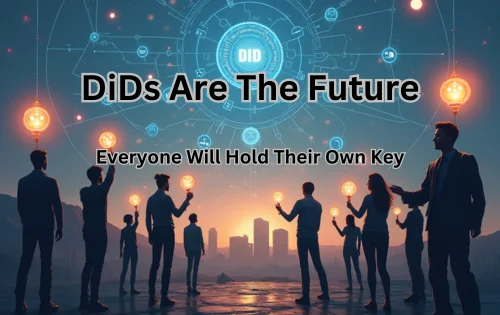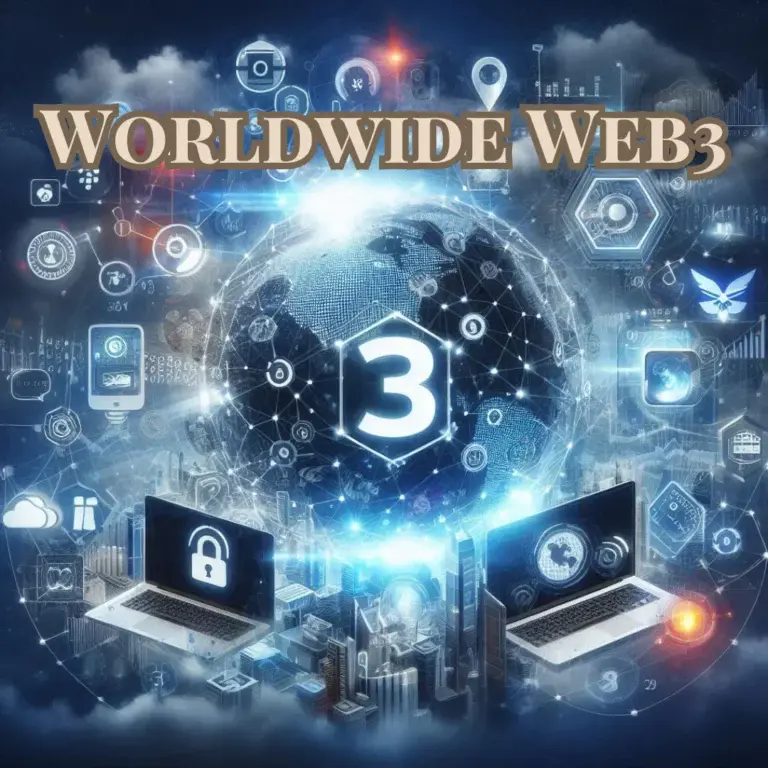Are You Losing Control of Your Digital Identity?
Centralized systems threaten your privacy and expose your personal data to risks.
Discover how decentralized identity solutions empower you to take control of your personal data in an increasingly centralized world.
With Trust Wallet, you can securely manage your digital identity, ensuring that your data remains private and under your control.
Join the movement towards a safer, more secure online presence—get Trust Wallet today!
In an age where our identities are more vulnerable than ever, understanding how we arrived at the concept of decentralized identity is crucial. Centralized identity systems have long governed how we prove who we are, but they come with significant risks. Let’s explore the evolution of identification and the urgent need for a more secure, decentralized approach.
The Evolution of Identification
The first noted uses of centralized identification trace back to tattoos, originally used as ownership marks, notably by slave owners as early as 1046 BC. As societies progressed, methods of identification evolved accordingly. Now we use things like passports and ID cards.
Key Milestones of Physical Identification
- 1414: Introduction of “safe conduct passes” (passports) by the English Parliament.
- 1829: The British Metropolitan Police Act emphasizes unique numerical identifiers.
- 1936: Social Security Numbers were established in the U.S.
Along Came the Internet & Digital Identification
As the internet revolutionized our lives, traditional identification methods migrated online. However, this transition came with significant challenges, as centralized entities continued to manage our digital identities, creating single points of failure ripe for exploitation.
Every document in the world was scanned and digitized including your identification. This storage of sensitive information brought about the need for some form of control as to who could have access to what. Digital identification was developed to show who we are online. Instead of a card, we use usernames and passwords or even our fingerprints and retinas on phones to prove our identity.
- The digitization of records in 1977 allowed for cross-referencing between banking and government databases.
- Innovations such as the Automated Fingerprint Identification System (AFIS) in the 1980s advanced identification methods.
- Consumer biometric authentication, like fingerprint sensors on smartphones, further enhanced identity verification.
As long as there has been identification, there has been misuse and forgery.
The Need to Change From Centralized to Decentralized Systems
For centuries, identification methods were centralized and controlled by governments or institutions, which led to vulnerabilities such as identity theft and data breaches. With the rise of the internet, traditional identification methods transitioned into the digital realm, but centralized entities continued to manage online identities.
This created single points of failure and significant security risks. Instead of gaining access to one person’s identification, these breaches are granting access to millions of sets of identifications.
- The largest data breach in history is the Yahoo data breach, which occurred in 2013 and affected all 3 billion user accounts. Initially disclosed in 2016, it was revealed that hackers had stolen names, email addresses, phone numbers, dates of birth, hashed passwords, and security questions and answers from Yahoo’s user database.
- The Marriott International breach (2018) compromised approximately 500 million guest records.
- Facebook breach (2019) affected around 540 million accounts.
History will continue to repeat itself. There will be more breaches.
We Are Not in Control
One of the most significant drawbacks of centralized identity systems is the lack of control we have over our personal data. In traditional systems, users often have minimal say over how their information is collected, used, or shared. How much information does Google have on you?
Google collects a significant amount of information about its users, including:
- Search History: Every search you perform is logged, allowing Google to create a profile of your interests and preferences.
- Location Data: If you use location services, Google tracks your movements and can provide insights into your daily routines.
- Device Information: Google gathers data from the devices you use to access its services, such as device type, operating system, and unique identifiers.
- Activity on Google Services: This includes interactions with Gmail, YouTube, Google Maps, and other services, contributing to a comprehensive understanding of your online behavior.
Curious About What Google Knows About You?
Taking control of your data is easy:
- Go to Google Account – myaccount.google.com.
- Sign In: Log in with your Google credentials if you aren’t already signed in.
- Data & Personalization: Click on “Data & personalization” in the left-hand menu.
- Manage Your Data: Here, you can view your activity data, including search history and location history. You can also manage what data is saved and delete any information you don’t want Google to keep.
- Privacy Checkup: Use the “Privacy Checkup” tool to review your privacy settings and see what information is being collected.
By exploring these settings, you can gain insight into your digital footprint and take steps to manage your personal information more effectively.
It is not just Google.
Centralized Authorities Have Your Data Too
The first thing that comes to mind here is the Government. It is much more than that, it’s corporations as well. The data breaches that I highlighted should have expanded the thought of centralized authorities. How many passwords do you have saved in your browser? Every password you have is a place that you have given your identification. These companies are using, sharing, selling, and losing your data to other interested companies. They are making decisions on your behalf without your consent or input.
Everyone is making money off of your data but you! And then there is your more sensitive information.
Privacy Concerns
How much personal information are you unknowingly sharing with centralized systems? From social security numbers to financial details, all of the data we provide is at risk. Have you ever considered how many companies have access to your sensitive information? The stakes are high. These centralized databases become prime targets for hackers, leading to significant data breaches that compromise millions of identities.
What Is Stopping Us from Decentralizing?
There are clear advantages of decentralized identity. Some barriers are real, others are part of you don’t know what you don’t know.
These include:
- Lack of Awareness: If you knew where to go to take back your identity would you?
- It is estimated that only 8% of the internet population understands how to do this. Many users are unaware of decentralized identity solutions and how they can benefit from them. Without education and outreach, traditional systems remain the default choice.
- Regulatory Challenges: Existing regulations favor centralized systems, creating an uneven playing field where decentralized technologies struggle to gain traction.
- Addressing these challenges will require updates to regulatory frameworks to accommodate the unique aspects of decentralization, fostering an environment where innovation can thrive.
- Technological Hurdles: The infrastructure for decentralized identity is still developing. Ensuring interoperability across platforms and creating user-friendly applications are essential for broader acceptance.
- Scalability and security are primarily technical challenges that the blockchain and cryptography communities are already tackling effectively.
- Standardization and integration depend more on collaboration among stakeholders (governments, businesses, and developers), which can be slower and more contentious.
- Resistance from Established Entities: Organizations that benefit from existing centralized systems will resist change due to concerns about losing control over user data (your data) and revenue streams.
Emergence of Decentralized Identity
Decentralized identity is like a brand-new way of thinking about who we are online, and it’s changing the game in how we manage our identities. Here are some key ideas explained simply:
- Self-Sovereign Identity (SSI): SSI means that you have complete control over your own digital identity. Picture a secure vault where you keep your important things—like your name, birthday, and other personal details.
- You get to decide what to keep inside that vault and who can see what’s in there. This gives you power over your own information, making it safer and more private.
- Decentralized Identifiers (DIDs): Introduced by the World Wide Web Consortium (W3C), DIDs are a new type of identifier that enables users to authenticate themselves across various platforms without needing a central registry. Think of DIDs as a universal passport that allows you to prove your identity wherever you go online.
Key Components of Decentralized Identity
Several foundational elements make decentralized identity viable, starting with blockchain technology. This technology serves as a tamper-resistant ledger for securely storing identity information. By leveraging blockchain, users can ensure that their data remains immutable and verifiable, significantly reducing the risk of tampering. Blockchain underpins the security and reliability that decentralized identity solutions offer, making it a robust choice for managing personal information.
Another key element is the use of verifiable credentials, which are cryptographically secure credentials issued by trusted entities. These credentials allow users to prove their identity without revealing unnecessary personal information. For instance, when presenting a driver’s license, you can verify your age without disclosing your full birthdate or home address. This feature enhances privacy while still providing the necessary verification, making it easier for individuals to share only what is essential.
Lastly, digital wallets play a crucial role in decentralized identity by acting as secure repositories for storing decentralized identifiers (DIDs) and verifiable credentials. Similar to a physical wallet, digital wallets enhance control and privacy, enabling users to manage their digital identities easily. This functionality allows individuals to have quick access to their identity information while ensuring that they maintain ownership and control over their data in a secure environment.
Advantages of Decentralized Identity -Why You Should Make the Change
Embracing decentralized identity offers compelling benefits that can significantly enhance your online experience and personal security. Here’s why you should consider making the switch:
Enhanced Security
Decentralized identity reduces the risks associated with centralized databases, which are prime targets for hackers. By managing your identity on a decentralized platform, you eliminate single points of failure. Your personal information is stored securely across a distributed network, making it much harder for malicious actors to access or compromise your data. This heightened security protects you from identity theft and data breaches, ensuring your information remains safe.
Greater Privacy and Control
With a decentralized identity, you regain control over your personal data. You decide what information to share and with whom, allowing for selective disclosure. This means you can verify your identity without exposing unnecessary details, such as your full address or birthdate. In a world where privacy is increasingly at risk, having the power to manage your own data is invaluable. You can navigate online spaces with confidence, knowing that you’re in charge of your digital footprint.
Improved User Experience
Decentralized identity streamlines the process of verifying your identity across different platforms. Instead of creating multiple accounts and remembering numerous passwords, you can use a single decentralized identifier to authenticate yourself. This not only simplifies your online interactions but also enhances convenience. Imagine having a universal digital passport that works everywhere, making logins easier and faster, while still maintaining your privacy and security.
Current Trends and Future Outlook: The Bright Future of Decentralized Identity
As technology evolves, decentralized identity is rapidly gaining traction across diverse sectors, including finance, healthcare, and social media. Organizations are increasingly recognizing the urgent need for secure, user-centric identity solutions that not only enhance privacy but also comply with stringent data protection regulations. This trend reflects a growing awareness that traditional identity systems are outdated and vulnerable, paving the way for innovative decentralized alternatives.
The transition to a digital-first world signals more than just a technological shift; it represents a fundamental change in how we perceive privacy and control over our personal information. By embracing decentralized identity, we are embarking on a journey toward a more secure and equitable digital landscape. Imagine a future where you can navigate online spaces with complete confidence, knowing that your identity is protected and that you have full control over your data.
Looking ahead, the future is undeniably bright. As we collectively move toward a world where decentralized identity becomes the norm, we will witness a transformation in how we interact online. Picture a scenario where all individuals are empowered with their own digital identities, easily verified across platforms without compromising privacy. This vision aligns with the principles of the World Wide Web Consortium (W3), promoting an internet where users are not just data points but owners of their own digital narratives. By adopting a decentralized identity today, we are not only enhancing our current experiences but also laying the groundwork for a more secure and user-centric digital future for generations to come.
Take Back Your Identity
Ready to take control of your digital identity? Discover the power of decentralized identity solutions! Sign up for Trust Wallet to securely manage your personal data, or explore educational courses on [Platform Name] to deepen your understanding. Join the movement towards a more secure and user-centric digital landscape today!”








